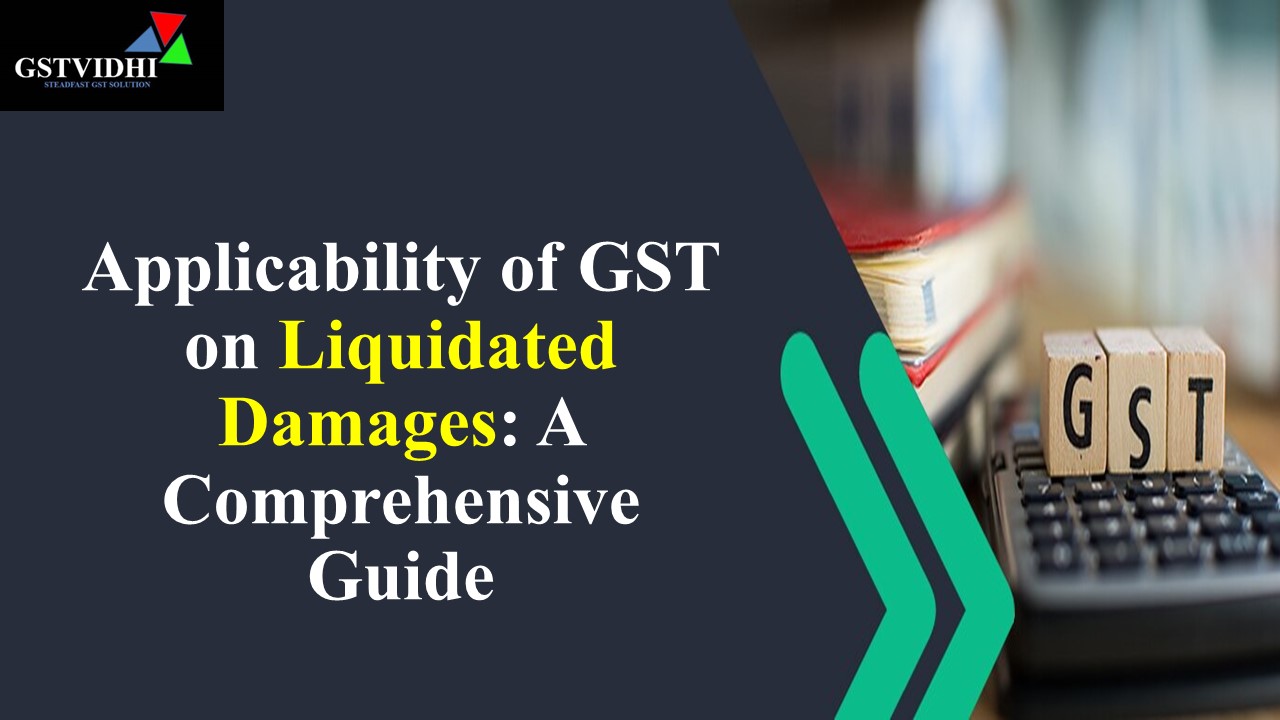
Applicability of GST on Liquidated Damages: A Comprehensive Guide
What Are Liquidated
Damages?
Liquidated damages are a
predetermined amount of money specified in a contract, payable as compensation
if one party fails to fulfill their contractual obligations. Essentially, it's
a financial safeguard agreed upon by both parties to address potential breaches
of the contract.
Why Do Contracts Include
Liquidated Damages?
Contracts often
incorporate liquidated damages for several key reasons:
- Ensure Compliance:
By setting a financial consequence for non-compliance, both parties are
more likely to adhere to the contract terms.
- Compensate for Losses:
They provide a clear, predetermined amount to cover losses or damages that
occur if the contract is breached, simplifying the process of
compensation.
- Avoid Litigation:
Pre-agreeing on the compensation amount helps avoid lengthy and costly
legal disputes.
Legal Foundation
Under the Indian Contract
Act, 1872:
- Section 73:
States that if a contract is broken, the aggrieved party is entitled to
receive compensation for any loss or damage caused by the breach.
- Section 74:
Provides that if a contract specifies a sum to be paid or a penalty for
breach, the aggrieved party is entitled to receive reasonable compensation
not exceeding the specified amount.
Key Characteristics of
Liquidated Damages
- Pre-agreed Amount:
The compensation amount is decided and agreed upon when the contract is
formed.
- Genuine Pre-estimate of Loss:
The amount should be a reasonable estimate of the actual loss or damage
that may occur due to a breach.
- Not a Penalty for Tolerating Breach:
Liquidated damages are meant to compensate for losses, not to reward the
aggrieved party for tolerating the breach.
Examples of Liquidated
Damages
1. Construction
Contracts: If a builder fails to complete a project within the
agreed timeline, they might have to pay liquidated damages to the buyer for the
delay.
2. Service
Agreements: If a service provider does not meet the service
levels specified in the contract, they might compensate the client with
liquidated damages.
3. Leases:
If a tenant terminates a lease early, they might pay liquidated damages as
specified in the lease agreement.
Tax Implications under
GST
The Goods and Services
Tax (GST) regime in India has specific implications for liquidated damages:
1. Non-taxable
Nature: Liquidated damages are generally not considered a
supply of goods or services under GST. Therefore, they are not subject to GST.
2. Compensation,
Not Supply: These payments are viewed as compensation for loss
or damage due to breach of contract, not as payment for any goods or services
provided.
3. Clarifications
and Rulings:
o CBIC
Circular No. 178/10/2022-GST: Clarifies that
liquidated damages are not subject to GST as they do not constitute
consideration for any supply.
o Advance
Rulings: Various advance rulings, including those by the
Andhra Pradesh Authority for Advance Ruling, have confirmed that liquidated
damages are not taxable under GST as they are merely compensation for
non-performance of the contract.
Detailed Explanation on
GST Implications
- Nature of Liquidated Damages:
Payments categorized as liquidated damages are compensatory in nature.
They are meant to indemnify the aggrieved party for the losses incurred
due to the other party’s failure to perform as per the contract.
- Not Consideration for Supply:
For any payment to be taxable under GST, it must be a consideration for
the supply of goods or services. Liquidated damages do not fit this
criterion as they are not payments for a supply but for a breach.
- Case Examples:
- Construction Delay:
If a builder pays liquidated damages for not completing the project on
time, this payment is seen as compensation for the buyer's inconvenience
and potential financial loss. It is not payment for any service provided
by the buyer, hence not taxable.
- Service Level Agreements:
If a company fails to meet the service levels and pays damages to the
client, these payments are compensatory, not a consideration for a supply
of services, and thus not subject to GST.
Practical Insights for
Businesses
- Drafting Contracts:
When drafting contracts, clearly specify the amount and conditions for
liquidated damages. This helps in straightforward enforcement and avoids
ambiguity.
- Assessing GST Liability:
Understand that while liquidated damages are generally not taxable, it's
essential to ensure that the payment does not indirectly constitute a
supply of goods or services.
- Legal Advice:
Consulting with legal and tax professionals can provide clarity on
specific contractual terms and their implications under GST.
Conclusion
Liquidated damages are a
crucial component of contracts, providing financial compensation for breaches
and encouraging compliance. Understanding their legal basis and tax
implications under GST is essential for businesses to ensure they handle these
payments correctly. By clearly defining liquidated damages in contracts and
recognizing their non-taxable nature under GST, businesses can avoid disputes
and ensure smooth contractual relationships.
Disclaimer: All the Information is based on the notification, circular and order issued by the Govt. authority and judgement delivered by the court or the authority information is strictly for educational purposes and on the basis of our best understanding of laws & not binding on anyone.
Click here